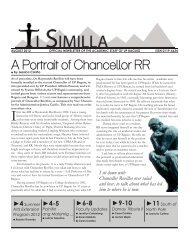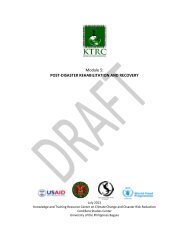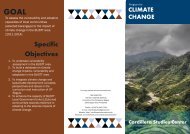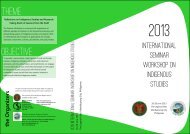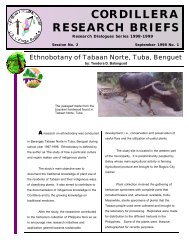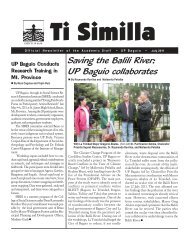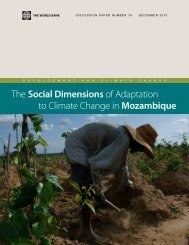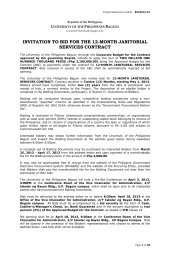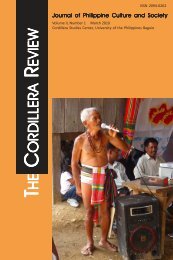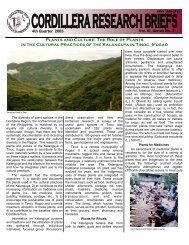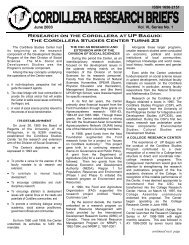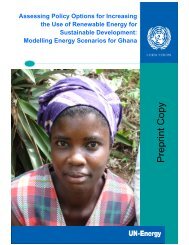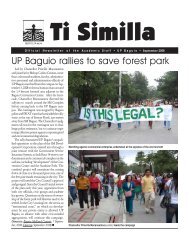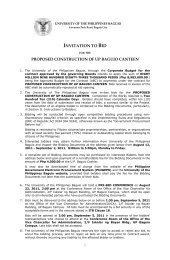Tanzania Report
Tanzania Report
Tanzania Report
You also want an ePaper? Increase the reach of your titles
YUMPU automatically turns print PDFs into web optimized ePapers that Google loves.
• Awareness, consultation and consent; and<br />
• Monitoring, reporting and verification.<br />
Each section presents relevant experiences and<br />
lessons from PFM, assesses current status within<br />
REDD+ and then presents options regarding<br />
how these experiences can be incorporated<br />
into emerging REDD+ proposals in <strong>Tanzania</strong>.<br />
Proposals, recommendations and policy options<br />
are presented in a final concluding section.<br />
Forest tenure and carbon rights<br />
<strong>Tanzania</strong> is currently promoting two different<br />
models of PFM—one where forest management<br />
rights and responsibilities are transferred from<br />
central or local government to community<br />
institutions in a legally enforceable manner<br />
(CBFM) and one where responsibilities for<br />
management are shared between the state and<br />
local actors (JFM) and where rights are largely<br />
unclear. Of the two models being promoted in<br />
<strong>Tanzania</strong>, CBFM appears to be the more effective<br />
in improving forest condition and reducing<br />
overall levels of forest disturbance. Studies<br />
conducted over the past five to ten years all point<br />
to the fact that when clear and enforceable rights<br />
together with corresponding responsibilities<br />
are fully devolved (as under CBFM), incentives<br />
appear to be sufficient for communities to invest<br />
in forest restoration and long term management<br />
(Blomley et al.2008). In situations where<br />
community managers are subject to weaker<br />
tenure, unclear rights and external governance<br />
influences, the link to improvements in forest<br />
management and conditions appear to be less<br />
clear (Persha and Blomley, 2009). These findings<br />
suggest therefore that verifiable emission<br />
reductions from reduced deforestation and forest<br />
degradation are more likely to be realized in<br />
situations when forest (and carbon) tenure rights<br />
are clear and enforceable, and when these rights<br />
and responsibilities are devolved to the lowest<br />
possible level.<br />
Clearly, the unfolding debate over REDD+<br />
and carbon rights has much that can be learned<br />
from the experiences of PFM. Carbon tenure<br />
(and by implication the rights to any payments<br />
that arise as the result of reduced emissions)<br />
remains one of the most complex and potentially<br />
controversial issues in the emerging debate<br />
on REDD+, not only in <strong>Tanzania</strong>, but also in<br />
many other countries. A binding decision by<br />
government on the allocation or transfer of<br />
carbon rights has yet to be taken. The following<br />
section reviews land and forest tenure systems<br />
in <strong>Tanzania</strong> and explores future options for the<br />
allocation of carbon rights and revenues.<br />
Land in <strong>Tanzania</strong> is divided into three broad<br />
categories—“reserved” land, “village” land<br />
and “general” land. Reserved land is land set<br />
aside by the government for a specific purpose<br />
(such as biodiversity conservation through the<br />
establishment of nature reserves or national<br />
parks). Village land is land that is under the<br />
direct management of village governments and<br />
includes land for settlement as well as local<br />
use, contained within the “village area.” The<br />
1999 Village Land Act defines general land as<br />
a residual category—‘all public land which is<br />
not reserved land or village land’. In contrast<br />
and somewhat confusingly, the 1999 Land Act<br />
defines general land as ‘all public land, which<br />
is not reserved land or village land and includes<br />
unoccupied or unused village land’. There are<br />
no provisions in either Act that clarify to what<br />
exactly the definition of unoccupied and unused<br />
refers.<br />
As a result of these legal inconsistencies,<br />
interpretations vary widely between different<br />
parts of government about the true extent of<br />
2<br />
Participatory Forest Management and REDD+ in <strong>Tanzania</strong>




